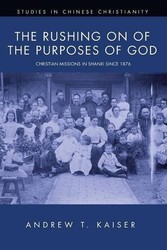 Faithful cross-cultural service requires at least some understanding of the local context. During my years in Shanxi I have invested a sizable portion of time and energy into helping my colleagues here—Chinese and expatriate—better understand local history, particularly as it pertains to ministry. I have been impressed over and over again by the striking degree to which the words and deeds of our spiritual ancestors relate directly to our present circumstances. My recently published The Rushing on of the Purposes of God: Christian Missions in Shanxi since 1876 was written to make these lessons from the past available to the larger China ministry community.
Faithful cross-cultural service requires at least some understanding of the local context. During my years in Shanxi I have invested a sizable portion of time and energy into helping my colleagues here—Chinese and expatriate—better understand local history, particularly as it pertains to ministry. I have been impressed over and over again by the striking degree to which the words and deeds of our spiritual ancestors relate directly to our present circumstances. My recently published The Rushing on of the Purposes of God: Christian Missions in Shanxi since 1876 was written to make these lessons from the past available to the larger China ministry community.
Though we often forget, we expatriates are not the first Christians to come to our part of China. This simple realization not only humbles us, it also opens the door to finding advice for our present troubles through the study of past efforts. As one example, I know that this year in particular many colleagues in China are struggling to think through the advisability and possible complications of cooperating more closely with the government. Nearly 150 years ago one of our forefathers had to deal with similar issues while trying to provide relief during the devastating North China Famine of 1876. I recount his experiences on page 13 of my book:
From his earlier work in Shandong, Timothy Richard had learned that it was very important to not surpass or supplant “imperial benevolence” or the work of the local officials, so he sought permission from Shanxi Governor Zeng Guoquan before distributing his [famine relief] funds. The governor was initially suspicious of Richard, fearing that the foreigner had come to stir up trouble among the dissatisfied populace; he may have heard that Richard had already been asked on two occasions to lead uprisings while distributing relief in Shandong. Attempting to “manage” Richard, he first required him to coordinate his relief with the Catholic Bishop of Shanxi (who refused to cooperate) and then required that Richard dispense relief in Taiyuan along with the government efforts. Richard agreed to work under the Taiyuan officials, and began coordinating his door-to-door cash dispersals with the official government grain relief in nearby Yangqu County. Names of Yangqu residents in need had already been collected by local officials, and Richard’s job was to hand five hundred cash to each person on the list. In order to tailor the relief to people’s actual needs, Richard increasingly relied on trusted Chinese assistants to visit the poor villages ahead of time and record the details of those households where relief was needed. Then Richard himself would visit each home individually and dispense need as he saw fit. Though disappointed at not being given permission to distribute over a wider range of territory, Richard understood the vital necessity of official good will, and thus was content to wait and move slowly. As conditions worsened, Governor Zeng’s belief that Richard had come to “steal the hearts of the people” lessened, and Richard was allowed to expand the scope of his work.
In this case, a course of cooperation and obedience was intentionally followed in order to develop trust that eventually led to official approval for expanded work. While it is important to avoid simplistic one-for-one comparisons between the past and the present, here is one instance from Chinese history where closer cooperation was effective. Might it work again?
As the Teacher says, “What has been is what will be, and what has been done is what will be done, and there is nothing new under the sun.” (Ecclesiastes 1:9) We are not the first cross-cultural workers to struggle with temptations to pride, linguistic and cultural differences, or our tendency to lose sight of the priorities that drive our ministry. Today, we fear persecution, heresy, expulsion, and division. Our predecessors in Shanxi were killed for their faith in 1900, struggled to apply notions of orthodoxy to the blossoming indigenous Christian movements from the mid-nineteenth century onwards, were forcibly ejected from the country in the early 1950s, and fought an unending battle with the disruptive consequences of human pride and strong personalities. Reading their stories puts our current troubles in perspective, while also reminding us that the God who carried them through their struggles is the same God who cares for us today.
Bringing the lessons of history into our ministry—serving in China while fully aware that we are “surrounded by so great a cloud of witnesses”—can bring tremendous comfort and encouragement. Learning from their past failures and successes enables us to serve more faithfully in the present, as we see afresh the unshakable trustworthiness of the One whose purposes continue to rush forward like a mighty train, carrying the hope of heaven across this land.
Image credit: Pingyao, Shanxi by Benjamin via Flickr.
Andrew T. Kaiser
Andrew T. Kaiser, author of Voices from the Past: Historical Reflections on Christian Missions in China, The Rushing on of the Purposes of God: Christian Missions in Shanxi since 1876, and Encountering China: The Evolution of Timothy Richard’s Missionary Thought (1870–1891) has been living and working in Shanxi with his …View Full Bio
Are you enjoying a cup of good coffee or fragrant tea while reading the latest ChinaSource post? Consider donating the cost of that “cuppa” to support our content so we can continue to serve you with the latest on Christianity in China.